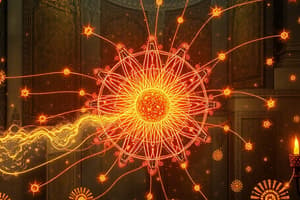Podcast
Questions and Answers
What significant particle did Rutherford discover in 1919?
What significant particle did Rutherford discover in 1919?
- Proton (correct)
- Electron
- Beta particle
- Neutron
Which model of the atom did Rutherford propose in 1911?
Which model of the atom did Rutherford propose in 1911?
- Rutherford model (correct)
- Plum pudding model
- Quantum model
- Bohr model
What prize did Rutherford receive in 1908 for his contributions to chemistry?
What prize did Rutherford receive in 1908 for his contributions to chemistry?
- Copley Medal
- Royal Society Medal
- Nobel Prize in Physics
- Nobel Prize in Chemistry (correct)
Which significant discovery related to radioactivity did Rutherford build upon?
Which significant discovery related to radioactivity did Rutherford build upon?
What type of radiation did Rutherford describe as being composed of positively charged particles?
What type of radiation did Rutherford describe as being composed of positively charged particles?
What experimentation did Rutherford conduct that led to the transmutation of elements?
What experimentation did Rutherford conduct that led to the transmutation of elements?
In which year did Rutherford publish his findings on alpha and beta radiation?
In which year did Rutherford publish his findings on alpha and beta radiation?
Who was Rutherford's influential mentor during his studies at Cambridge University?
Who was Rutherford's influential mentor during his studies at Cambridge University?
What was a significant conclusion drawn from Rutherford's gold foil experiment?
What was a significant conclusion drawn from Rutherford's gold foil experiment?
How did Rutherford's atomic model challenge the plum pudding model?
How did Rutherford's atomic model challenge the plum pudding model?
What was the implication of Bohr's fixed energy levels for electrons?
What was the implication of Bohr's fixed energy levels for electrons?
What discovery did Rutherford make about the hydrogen nucleus?
What discovery did Rutherford make about the hydrogen nucleus?
Which aspect of Rutherford's model sparked a radical shift in atomic theory?
Which aspect of Rutherford's model sparked a radical shift in atomic theory?
What was a key contribution of James Chadwick under Rutherford's guidance?
What was a key contribution of James Chadwick under Rutherford's guidance?
What did the discoveries by Rutherford and Bohr collectively imply about classical physics?
What did the discoveries by Rutherford and Bohr collectively imply about classical physics?
Which term did Rutherford use to name the positively charged particle he discovered?
Which term did Rutherford use to name the positively charged particle he discovered?
Flashcards
Rutherford's discovery of radiation and disintegration
Rutherford's discovery of radiation and disintegration
Rutherford identified two types of radiation: alpha and beta radiation, and he demonstrated that elements could disintegrate into smaller components.
Rutherford model of the atom
Rutherford model of the atom
Rutherford's model depicts electrons orbiting a tiny, positively charged nucleus at the center of the atom.
What is alpha radiation?
What is alpha radiation?
Rutherford discovered alpha radiation consists of positively charged particles, which are now known as alpha particles.
Transmutation of elements
Transmutation of elements
Signup and view all the flashcards
Rutherford's gold foil experiment
Rutherford's gold foil experiment
Signup and view all the flashcards
Atoms are not indivisible
Atoms are not indivisible
Signup and view all the flashcards
Building on Becquerel's work
Building on Becquerel's work
Signup and view all the flashcards
Impact of Rutherford's research
Impact of Rutherford's research
Signup and view all the flashcards
What did Rutherford's gold foil experiment reveal about the atom?
What did Rutherford's gold foil experiment reveal about the atom?
Signup and view all the flashcards
What was Rutherford's model of the atom?
What was Rutherford's model of the atom?
Signup and view all the flashcards
What essential refinement did Bohr make to Rutherford's model?
What essential refinement did Bohr make to Rutherford's model?
Signup and view all the flashcards
What discovery did Rutherford make that led to the identification of the proton?
What discovery did Rutherford make that led to the identification of the proton?
Signup and view all the flashcards
What key experiment proved Rutherford's theory of the transmutation of elements?
What key experiment proved Rutherford's theory of the transmutation of elements?
Signup and view all the flashcards
What did Rutherford's discovery of the proton lead to?
What did Rutherford's discovery of the proton lead to?
Signup and view all the flashcards
What is the broader impact of Rutherford's research?
What is the broader impact of Rutherford's research?
Signup and view all the flashcards
What chemical element was named after Rutherford?
What chemical element was named after Rutherford?
Signup and view all the flashcards
Study Notes
Ernest Rutherford's Contributions to Atomic Theory
- Rutherford transformed our understanding of the atom by identifying its components and revealing its inner structure.
- He demonstrated atoms could disintegrate into smaller constituents, and identified two types of radiation: alpha and beta radiation.
- He showed that atoms can disintegrate into smaller constituents and described two types of radiation: gamma and beta radiation.
Rutherford's Early Life and Education
- Born into a farming family in the village of Brightwater on the South Island of New Zealand.
- After winning a scholarship to Canterbury College (now the University of Canterbury), he gained three science degrees.
- Then won an overseas scholarship and went to Cambridge University to work with the physicist J. J. Thomson.
- Impressed with his quality of physics research, in 1898, Thomson recommended him for a professorship at McGill University in Montreal, Canada. Aged only 27, Rutherford was accepted at McGill, and set sail for Canada.
Rutherford's Discoveries at McGill University
- Conducted research that earned him a Nobel Prize for his investigations into the disintegration of elements.
- Radioactivity had been recently discovered by Henri Becquerel.
- Rutherford identified the electron as a negatively charged subatomic particle.
- Showed that atoms are made of smaller parts that release radioactivity as they decay.
- Classified radioactive emissions into alpha and beta radiation. Alpha radiation consists of positively charged particles.
Transmutation of Elements
- Performed the first transmutation of elements.
- Using his apparatus, Nitrogen atoms were transformed into Oxygen atoms by colliding them with alpha particles. This apparatus involved a tube with a window that showed the emitted protons.
- This work was conducted in the Cavendish Professor of Experimental Physics at Cambridge University, in 1919.
Rutherford's Quote
- “I have broken the machine and touched the ghost of matter.” (1917).
Studying That Suits You
Use AI to generate personalized quizzes and flashcards to suit your learning preferences.




